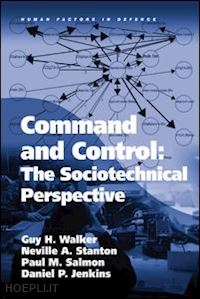Guy H Walker read for a BSc Honours degree in Psychology at Southampton University specialising in engineering psychology, statistics and psychophysics. During his undergraduate studies he also undertook work in auditory perception laboratories at Essex University and the Applied Psychology Unit at Cambridge University. After graduating in 1999 he moved to Brunel University, gaining a PhD in Human Factors in 2002. His research focused on driver performance, situational awareness and the role of feedback in vehicles. Since this time Guy has worked for a human factors consultancy on a project funded by the Rail Safety and Standards Board, examining driver behaviour in relation to warning systems and alarms fitted in train cabs. Currently Guy is a Senior Research Fellow within the HFI DTC at the University of Southampton, engaged primarily in work on future C4i systems. He is also author of numerous journal articles and book contributions. Professor Stanton holds a Chair in Human Factors in the School of Civil Engineering and the Environment at the University of Southampton. He has published over 140 peer-reviewed journal papers and 14 books on Human Factors and Ergonomics. In 1998 he was awarded the Institution of Electrical Engineers Divisional Premium Award for a co-authored paper on Engineering Psychology and System Safety. The Ergonomics Society awarded him the Otto Edholm medal in 2001 and The President's Medal in 2008 for his contribution to basic and applied ergonomics research. In 2007 The Royal Aeronautical Society awarded him the Hodgson Medal and Bronze Award with colleagues for their work on flight deck safety. Professor Stanton is an editor of the journal Ergonomics and on the editorial boards of Theoretical Issues in Ergonomics Science and the International Journal of Human Computer Interaction. Professor Stanton is a Fellow and Chartered Occupational Psychologist registered with The British Psychological Society, and a Fellow of The Ergonomics Society. He has a BSc (Hons) in Occupational Psychology from the University of Hull, an MPhil in Applied Psychology and a PhD in Human Factors from Aston University in Birmingham. Paul Salmon is a Senior Research Fellow in the Human Factors Group at Monash University and holds a BSc in Sports Science and an MSc in Applied Ergonomics, (both from the University of Sunderland). Paul has over six years experience in applied human factors research in a number of domains, including the military, civil and general aviation, rail and road transport and has previously worked on a variety of research projects in these areas. This has led to Paul gaining expertise in a broad range of areas, including human error, situation awareness, and the application of human factors methods, including human error identification, situation awareness measurement, teamwork assessment, task analysis and cognitive task analysis methods. Paul's current research interests include the areas of situation awareness in command and control, human error and the application of human factors methods in sport. Paul has authored and co-authored various scientific journal articles, conference articles, book chapters and books and was recently awarded the Royal Aeronautical Society Hodgson Prize for a co-authored paper in the society's Aeronautical journal. Dan Jenkins graduated in 2004, from Brunel University, with an M.Eng (Hons) in Mechanical Engineering and Design, receiving the 'University Prize' for the highest academic achievement in the school. As a sponsored student, Dan finished University with over two years experience as a Design Engineer in the Automotive Industry. Upon graduation, Dan went to work in Japan for a major car manufacturer, facilitating the necessary design changes to launch a new model in Europe. In 2005, Dan returned to Brunel University taking up the full-time role of Research Fellow in the Ergonomics Research Group, working primarily on the Human Factors Integration Defence Technology Centre (HFI-DTC) project. Dan studied part-time on his PhD in human factors and interaction design - graduating in 2008, receiving the 'Hamilton Prize' for the Best Viva in the School of Engineering and Design. In March 2009, Dan founded Sociotechnic Solutions Limited, a company specialising in the design and optimisation of complex sociotechnical systems. Dan has authored and co-authored numerous journal paper, conference articles, book chapters and books. Dan and his colleagues on the HFI DTC project were awarded the Ergonomics Society's President's Medal in 2008.












